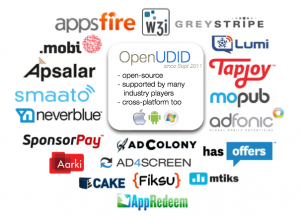 OpenUDID is taking a radical turn with the arrival of iOS 6. The specifics of the turn cannot really be exposed at this stage given the fact that the instigator is bound to the pre-release iOS 6 NDA (in effect until iOS 6 is released sometime this fall).
OpenUDID is taking a radical turn with the arrival of iOS 6. The specifics of the turn cannot really be exposed at this stage given the fact that the instigator is bound to the pre-release iOS 6 NDA (in effect until iOS 6 is released sometime this fall).
That being said, for those who either can read between lines (of code) or better yet, for those who also have access to the iOS 6 pre-release, the latest open-source update should shed some lights into the evolution of OpenUDID.
A brief history of OpenUDID, to refresh memories. In June 2011, Apple announced the deprecation of UDID in iOS 5. This led to the creation of OpenUDID.org, a drop-in and open-source contingency plan announced on Sept. 1st 2011 Appsfire introduces the open source OpenUDID initiative. Fueled with speculation, tales of app rejection, and still unknown future, OpenUDID became massively relevant in March 25 2012 OpenUDID – now is the time! and then subsequently adopted by over 17 ad networks OpenUDID reaching critical mass adoption, including consultations for the ODIN working group as well as think tank sessions at the Mobile Marketing Association. All the meanwhile, we were hoping that Apple was working towards a long-lasting solution to fix this, perhaps with an opt-in popup for the user, perhaps with an explicit declaration by the developer at submit time…

Since then, WWDC 2012 happened, and during the session on Privacy Support, the future of UDID was revealed. Exactly a year after the thunderstorm, Apple has done right by us.
Does this mean OpenUDID will go the way of deprecation? Yes at some point. However… as deprecation goes, there is latency built-in. The latest code change in OpenUDID suggests that OpenUDID remains especially relevant in this transition period, i.e. the period during which lots of apps are written for both iOS 5 and iOS 6, where devices gradually upgrade from iOS 4 & 5 to 6, etc… It is a fair assumption that iOS 6 won’t obliviate iOS 5 for many months to come, so OpenUDID should remain the go-to solution of “UDID” handling well into 2013… and not just for iOS (ports available for Mac OS X, Android, and others).
One more thing, not the least: more than ever, above and beyond APIs and lines of code, transparency regarding the use of user tracking will help a great deal getting approved by the Apple Review Team, and more importantly, get trusting endorsement from your users; so update your Terms & Conditions with a clear Privacy statement!





